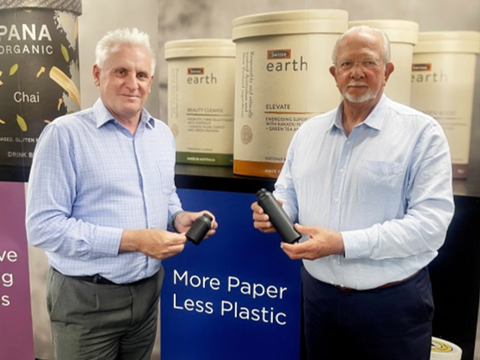
Zipform Packaging has developed a bottle made with 95% wood-based fibre and over 50% post-consumer recycled content, replacing the conventional plastic liner with a moisture- and oxygen-resistant barrier layer to improve recyclability.
As first appeared in a PKN Packaging News exclusive, the bottle’s ability to balance high fibre content with barrier functionality is described by Zipform as a ‘world first’.
Its development stemmed from Quality & Innovation director David Kilpatrick’s experience in fibre-based packaging technology, which led him to utilize the linear forming process to develop a fibre-based replacement for plastic bottles.
“Initially, we focused on round and non-round packaging for food applications,” he explains, “but liquids were always on our radar and the developments within the moulded fibre category led us to realise that we could adapt our expertise to create a fully functional threaded paper bottle.
“Our process applies a barrier layer in a way that avoids the need for a plastic liner. Instead of a separate layer of plastic, we use a technology similar to that used in a print process to apply a very thin barrier coating.”
This reportedly ensures the bottle is suitable to hold liquids and protect the fibre-based structure against moisture and oxygen – all while negating the need for plastic liners, which have previously come under fire for impacting the recyclability of fibre-based bottle designs.
Due to the absence of plastic components, the bottle is expected to offer a high fibre yield when recycled.
“We’ve conducted extensive recyclability testing, and the results confirm that our packaging achieves excellent fibre recovery rates,” says Zipform CEO John Bigley.
As well as undergoing the standards test method in Zipform’s native Australia, the bottle will be subject to Cepi recyclability testing in Europe in the future. Its 50% post-consumer recycled content is expected to differentiate the product from other paper bottles on the market.
“We are committed to meeting global recyclability benchmarks, ensuring that this innovation aligns with circular economy principles,” Kilpatrick adds.
Furthermore, Zipform’s modular technology is expected to adapt bottle size quickly, facilitate a smooth transition from plastic to fibre-based packaging, and help scale up its solution.
“Instead of investing in multiple sets of tooling for different bottle sizes, our process allows brands to produce multiple sizes with a single toolset, significantly reducing costs and complexity,” says Kilpatrick.
“We will see production speeds of more than 300 bottles per minute, compared to some existing fibre bottle technologies that take seconds per unit.”
Zipform’s process also lets customers adjust bottle height for different product applications; Kilpatrick identifies potential uses to package spices, seasonings, and dry goods.
“We see major opportunities in non-carbonated beverages, dairy, and nutraceuticals,” Bigley suggests. “Nutraceuticals, in particular, rely heavily on plastic and glass packaging, and we believe this sector will be an early adopter of our solution.”
Second- and third-generation materials are currently being tested, Kilpatrick explains; these are thought to have increased the bottle’s fibre content to over 97%. Barrier performance trials are currently in progress, with brand owners invited to participate in market testing in time for a commercial launch scheduled for 2026.
Zipform also seeks to apply its barrier technology to trays, tubs, and flexible packaging, among other formats.
“We’re on a mission to push the boundaries of what’s possible with fibre,” Bigley concludes. “Fibre-based packaging offers a real, scalable alternative that aligns with sustainability goals and consumer demand.”
Another fibre-based bottle with a natural polymer coating was pitched by NBCo at the World Economic Forum Annual Meeting in Davos in January. It is designed to be 99% recyclable and biodegrade in the environment, with biodegradability testing in soil and seawater expected to be released in early 2025.
NBCo has also launched its Fast Forward 50 initiative, which intends to help brands switch from single-use plastic bottles to fibre-based alternatives. The first fifty brands to sign up will receive free 200ml bottles for testing.
Pulpex has also launched a £62m Series D investment round for its fibre-based bottle. Led by the National Wealth Fund and the Scottish National Investment Bank, the company aims to construct a commercial-scale manufacturing facility near Glasgow.
If you liked this story, you might also enjoy:
The ultimate guide to the Packaging and Packaging Waste Regulation in 2024
How are the top brands progressing on packaging sustainability?
Sustainable Innovation Report 2024: Current trends and future priorities
Everything you need to know about global plastic sustainability regulation














No comments yet